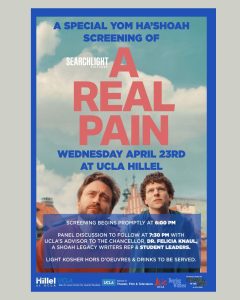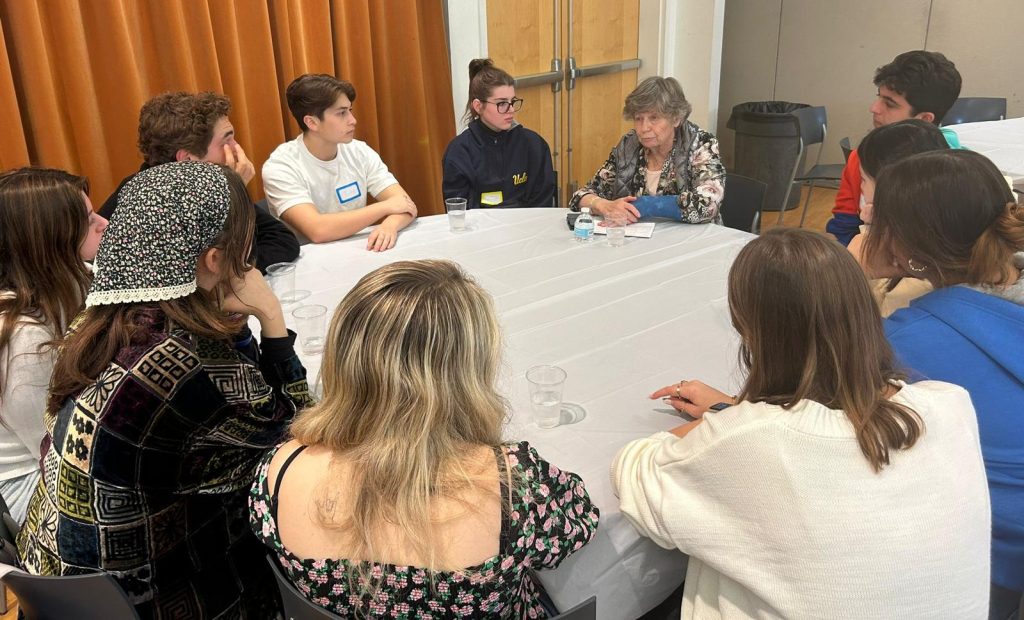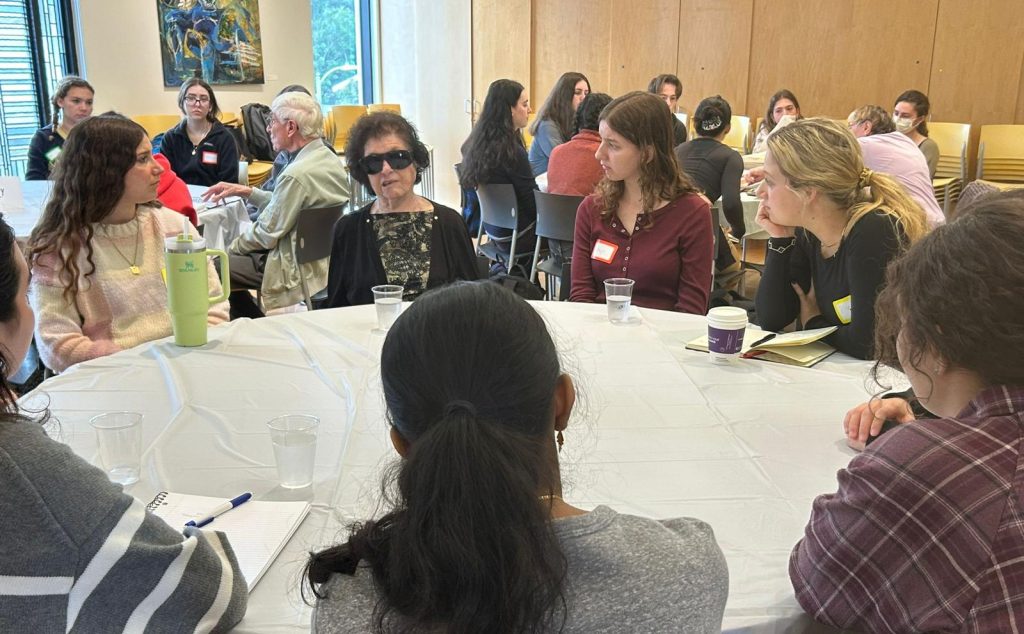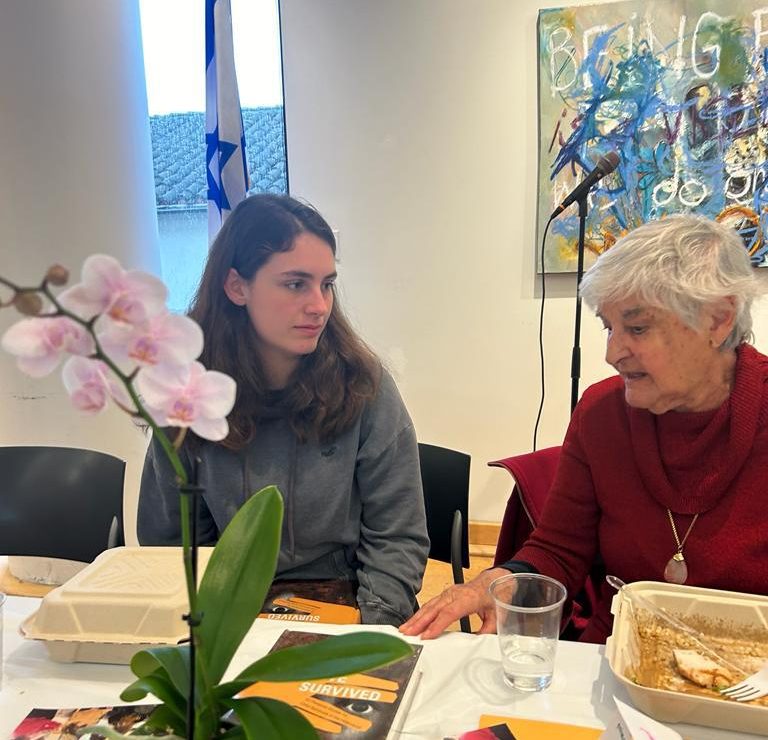Remembering the Holocaust: Hillel at UCLA’s Bearing Witness Program Passes the Torch to New Generations
In a powerful testament to the importance of Holocaust remembrance, Hillel at UCLA’s Bearing Witness program continues to engage students in preserving survivor stories while adapting to a changing world. As Holocaust survivors dwindle in number, second and third-generation descendants have stepped forward to ensure these crucial narratives endure.
 During a recent Yom HaShoah (Holocaust Remembrance Day) event, Hillel at UCLA screened “A Real Pain,” an Academy Award-winning film that explores Holocaust memory through a third-generation perspective. The screening was followed by a multigenerational panel discussion that confronted a pivotal question: How will we remember the Holocaust when no survivors remain to tell their stories?
During a recent Yom HaShoah (Holocaust Remembrance Day) event, Hillel at UCLA screened “A Real Pain,” an Academy Award-winning film that explores Holocaust memory through a third-generation perspective. The screening was followed by a multigenerational panel discussion that confronted a pivotal question: How will we remember the Holocaust when no survivors remain to tell their stories?
Sharona Kaplan, co-Director of JLIC at UCLA, moderated the panel discussion. As a third-generation of a Holocaust survivor herself and one of the coordinators and facilitators of the Bearing Witness program, Kaplan brought personal insight to the conversation about how Holocaust remembrance evolves across generations.
“We’re taking a foray into that future and using film as a medium for communicating the story,” Kaplan noted, highlighting the evening’s significance as an exploration of post-survivor Holocaust remembrance. The panel examined whether such films, which may present more accessible but sometimes lighter treatments of Holocaust history, can adequately preserve the weight and significance of survivor testimonies.
The panel featured an insightful cross-section of generations: fourth-generation student leaders from the Bearing Witness program, second-generation children of survivors, and Kaplan representing the third generation. This multigenerational structure highlighted the evolution of Holocaust remembrance as it passes from direct survivors to their descendants and beyond.

One of the student panelists, an international student from Brazil whose family relocated there after the Holocaust, shared how a March of the Living trip in high school inspired her current leadership role. Notably, another student leader had no direct family connection to Holocaust survivors but felt compelled to participate through personal conviction—demonstrating how Holocaust education transcends genealogy.
The discussion addressed critical questions about the shifting landscape of Holocaust commemoration on campus. Kaplan reflected on the evolution she’s witnessed—from reading names aloud in the center of campus to years when formal commemorations didn’t occur at all. This changing approach to remembrance demonstrates the challenge of keeping Holocaust memory relevant to new generations of students.

Hillel at UCLA’s Bearing Witness program operates throughout the winter quarter, pairing students with Holocaust survivors over multiple sessions. The program alternates between survivor meetings and reflection sessions, creating space for both testimony and processing. Approximately 20% of participants are non-Jewish students, signaling broader interest in understanding antisemitism and this dark period of history.
As one second-generation panelist described himself as a “torch bearer,” the event underscored the critical responsibility facing descendants of survivors. With first-generation witnesses almost gone, the duty of testimony has shifted to children and grandchildren who must now become the primary storytellers.
Recent campus tensions around antisemitism gave the commemoration additional resonance. One older panelist shared how campus encampments had “triggered something in him that doubled down on the importance” of Holocaust education, connecting historical memory to contemporary concerns.

The panel explored the balance between historical accuracy and emotional impact in Holocaust storytelling, as well as the transformative experience of visiting ancestral birthplaces or concentration camps. One student beautifully reflected on how her grandparents’ survival depended on acts of kindness from others—inspiring her own commitment to “sprinkle good through life.”
As direct survivors become fewer each year, programs like the Hillel at UCLA’s Bearing Witness represent a vital bridge, ensuring that these crucial testimonies continue to educate and inspire future generations. Through innovative approaches to remembrance and the voices of descendants like Kaplan and committed allies, the solemn promise to never forget remains vibrantly alive.
Reach out to any of our Directors to learn more about JLIC and to support our programming.
Related Posts
Remembering the Unfathomable: Commemorating Yom HaShoah with JLIC
Honoring the Past, Embracing the Present: Yom HaShoah Commemoration with the Tel Aviv JLIC Community
From Stress to Success: Young Couples Unite for JLIC’s Shalom Bayit Workshop
JLIC West Coast Initiative Supporting Health Science Students
From Campus to Courtroom: JLIC Empowers Jewish Law School Students